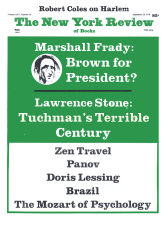In response to:
The Bakke Decision: Did It Decide Anything? from the August 17, 1978 issue
To the Editors:
As an addendum to Ronald Dworkin’s fine account of the weaknesses of Justice Powell’s opinion on the Bakke case, it is worth noting that comparisons between the Davis plan and the Harvard plan are inappropriate in still another sense: Powell has compared access to a very scarce resource to the availability of a relatively plentiful one.
There is no great shortage of undergraduate places, and for the individual who gets into one of the millions of undergraduate “slots,” the economic benefits are uncertain. Obviously, the situation in medical schools is quite different. There are very few medical school places. An individual obtaining one of them is almost assured of an enormous economic “payoff.”
Powell’s opinion errs in treating admission to the two as equivalent.
W. Paul Vogt
Albany, New York
Ronald Dworkin replies:
Professor Weiss begs the main question in issue. Proponents of affirmative action believe that professional schools will produce graduates that are, as a group, professionally more useful if that group includes more members of minorities. That reasonable hypothesis may prove wrong, as I conceded in my earlier article, but Weiss does not advance the discussion by ignoring it. His conflation of race with “musical ability” and “athletic prowess,” moreover, shows that he has misread Mr. Justice Powell’s opinion. Powell did not argue that medical and other professional schools should seek the same level or character of diversity as undergraduate colleges seek, but rather that they should aim at whatever diversity is appropriate to their educational purpose, which, in the case of medical schools, includes racial but not musical diversity. Perhaps Weiss thinks that black medical students contribute no more to the professional education of their fellow students (who might otherwise be ignorant of the special medical, social, and psychological problems of the black community) than basketball players do. If so, he is wrong.
Mr. Vogt has also, I think, misread Powell’s opinion. Powell’s argument does not assume that admission to professional and to undergraduate schools are “equivalent” in the respects Mr. Vogt describes, or, indeed, in any other respects. Powell argues only that both sorts of institutions have a constitutionally protected right to seek educationally useful diversity in their student bodies. I cannot tell whether Mr. Vogt believes that the greater scarcity and economic value of medical schools argues for or against affirmative action there. It is true that someone who is denied a place in a particular medical school may suffer more or may lose more in consequence than someone who is denied admission to a particular undergraduate college. But that argues against affirmative action in medical schools only if it is assumed, wrongly, that those who score higher on conventional tests are entitled to scarce places in preference to others who have different qualities that are also socially useful. On the contrary, the prestige and high economic value of medical education make it all the more important that these places do not remain the prerogative of one race only.
This Issue
September 28, 1978



